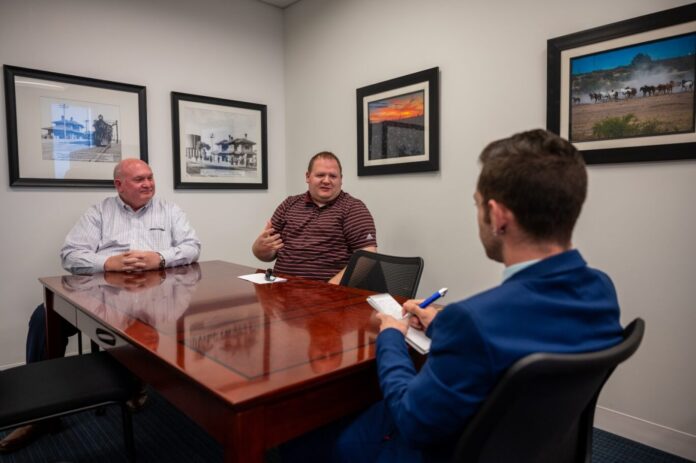
In 2015, Ben Bitter dispatched cops to the frontlines of a protest on the steps of a federal courthouse to tangle with Westboro Baptist Church extremists.
As a landmark ruling on gay marriage made headlines and history inside, the Ashland, Ky., city manager found himself in the eye of a storm of national press and FBI agents, looking on from his office just across the street.
“It was a surreal moment,” Bitter said during an interview with InMaricopa last month at Maricopa City Hall. He looked pensively out the sunlit window of the well-appointed office he will soon inherit.
“It became very clear that the role of a manager is to lead, often through times of crisis,” he recalled. “I’ve used those leadership lessons every day since then.”
Bitter curried Maricopa City Council’s favor over two other internal candidates in December to become the next top brass. First slated to succeed outgoing City Manager Rick Horst in July, Bitter’s start date was recently moved up to April 1.
Horst and Bitter “mutually agreed they are ready for the changeover and are looking forward to assuming their new roles,” city spokesperson Monica Williams said.
It’s a second chance for Bitter. Ashland City Commission fired him in 2016, marking the first time such action was taken in decades.
Bitter says it was gutter politics and poor timing. He’s a husband and father of three with deep ties in Pinal County, and he’s ready to open a new chapter of leadership, making Maricopa “a city worthy of our affection.”
All about ben
After earning his master’s degree in public administration, Bitter’s career started in Casa Grande with a seven-year stint in the city manager’s office.
When things soured in Kentucky, he returned to Pinal County as the assistant to the town manager of Florence until 2021, joining Maricopa staff that year to direct engineering and capital improvement at Horst’s behest.
“I recruited Ben several years ago,” Horst remembered in a recent interview. It was Bitter’s forward thinking that piqued Horst’s interest.
Since his return to Pinal County, Bitter served on the Arizona City/County Management Association’s board.
“I’ve spent years and years in Pinal County,” he said. “I think I have a unique set of skills when working with all of our neighboring communities.”
As deputy city manager, Bitter oversaw $128 million of capital projects in a single fiscal year. He played an intimate role in opening the Sonoran Desert Parkway last year, the city’s largest undertaking ever and Bitter’s favorite personal accomplishment.
“Obviously, I have a passion for transportation,” he said. “That is one of the things that both keeps me up at night and gets me up in the morning.”
Bringing new expertise and passion to transportation solutions — widely agreed to be the city’s most overt need — Bitter leaves the bulk of economic development work to Horst in a new role.
Specialty hats
Horst announced he’d step down as city manager in September after six years in that role, taking a new tailor-made job as chief operations officer. In that role, Horst will work fewer hours and see a pay cut.
Bitter, meanwhile, becomes the city’s highest-paid staffer ever at $242,000 a year. That’s an $83,7000 raise over his current salary and $20,000 more than Horst’s city manager pay.
During Horst’s tenure, the city budget more than doubled from $70 million to $160 million. In response to that growth, “You begin to take off that generalist hat and start finding people who wear specialty hats,” he said.
Enter Bitter, who’s credited with special skills in transportation and inter-governmental cooperation.
“Something really unique about me is my network and my collaboration skills,” he said. “I bring forth the best ideas, not to copy them but enhance them and make them right for Maricopa.”
Horst said there’s something else Bitter brings to the table that he couldn’t offer:
“Frankly, I don’t have the patience to deal with politics. Ben does.”
Kentucky blues
Politics. That’s what led to Bitter’s termination in Ashland, not the accusations levied against him, he contends.
Ashland’s commission voted 3-2 to fire Bitter, citing he violated various city policies. The commission later rescinded the vote and gave him the option to resign, according to The Daily Independent.
Commissioners lobbed several administrative accusations prior to their vote. That Bitter issued a $7,000 check to a city employee as advanced vacation pay — an action explicitly against city policy — and neglected to investigate more than $200,000 missing from the city’s expenditure on tires.
Shortly after the vote, commissioners cited mixed views on the decision.
One told The Herald-Dispatch he felt “a general lack of confidence” in Bitter, but another called the accusations “asinine.”
Bitter told InMaricopa he “took great learning experiences” from his time in Boyd County, Ky.’s largest city. It was transitioning from what had been a regional center to a shrinking community burdened with challenges — a shrinking job base, the closure of a major steel plant and dwindling budgets, he said.
He denied any wrongdoing.
“In every aspect of my career, from start to finish, I have been governed by a code of ethics,” he said. “I stand by a code of ethics. I, in every sense, still abide by that same code of ethics. I look at myself in the mirror every day and I am grateful for that code of ethics that I stand on.”
The hiccup didn’t sway Maricopa City Council’s decision to place Bitter back in the top municipal role. Councilmember Vincent Manfredi said his faith in Bitter is unwavering.
“I don’t put much weight into Ben’s dismissal at Ashland,” he said.
A poll by The Daily Independent found more than 81% of its readers did not agree with the city commission’s decision to terminate Bitter.
The ultimate goal
As Bitter moves his family of five from Queen Creek, he said he will do everything in his power to make Maricopa the perfect community to raise his three daughters.
His team is “getting closer and closer to its ultimate goal every day,” he said.
What’s the ultimate goal? It’s not revenue. It’s not growth.
“Our ultimate goal is that each and every citizen finds greater joy in being here.”
Reality check
“People think it’s the government’s role to grow the city,” Horst told InMaricopa. “They’re mistaken.”
In Maricopa, as with most cities, the city manager is tasked with implementing the council’s policies, strategic planning, fiscal sustainability and oversight of all city personnel.
“Most people don’t understand what city managers do,” Horst said. “They do not set policy or budget. People forget that.”
No one wants to pay taxes, but everyone wants government services, Horst asserted. Of 24 Pinal County cities, only six set municipal tax rates lower than Maricopa, and they’re the tiniest — Oracle, San Manuel, Picacho, Stanfield, Red Rock and Arizona City.
But complaints over taxes frequent Horst’s desk.
“So many people have an entitlement attitude today,” he contended.
Also among the most popular citizen requests Horst fields are pleas to “block” a business from opening in town.
That’s unamerican, Horst said. And if the government starts banning business, who’s to say the complainer’s small business won’t be next?
“Last time I checked, we’re not Russia. They need to be careful what they ask for because they might get it one day.”
Horst admitted the city always has room for improvement. He said he has utmost faith in new City Manager Ben Bitter to take up his mantle and work daily to bring those improvements to fruition.
“We are the imperfect union, yet, we have to be united,” Horst said. “I’m just an old-fashioned guy who believes the government works for the people — but the people have to engage, and they have to be a part of the process.”
Editor’s note: Monica D. Spencer contributed to this report. Vincent Manfredi is an owner of InMaricopa.




![City gave new manager big low-interest home loan City Manager Ben Bitter speaks during a Chamber of Commerce event at Global Water Resources on April 11, 2024. Bitter discussed the current state of economic development in Maricopa, as well as hinting at lowering property tax rates again. [Monica D. Spencer]](https://www.inmaricopa.com/wp-content/uploads/2024/04/spencer-041124-ben-bitter-chamber-property-taxes-web-218x150.jpg)

![3 things to know about the new city budget Vice Mayor Amber Liermann and Councilmember Eric Goettl review parts of the city's 2024 operational budget with Mayor Nancy Smith on April 24, 2024. [Monica D. Spencer]](https://www.inmaricopa.com/wp-content/uploads/2024/04/spencer-042424-preliminary-budget-meeting-web-218x150.jpg)





![Alleged car thief released without charges Phoenix police stop a stolen vehicle on April 20, 2024. [Facebook]](https://www.inmaricopa.com/wp-content/uploads/2024/04/IMG_5040-218x150.jpg)




![City gave new manager big low-interest home loan City Manager Ben Bitter speaks during a Chamber of Commerce event at Global Water Resources on April 11, 2024. Bitter discussed the current state of economic development in Maricopa, as well as hinting at lowering property tax rates again. [Monica D. Spencer]](https://www.inmaricopa.com/wp-content/uploads/2024/04/spencer-041124-ben-bitter-chamber-property-taxes-web-100x70.jpg)